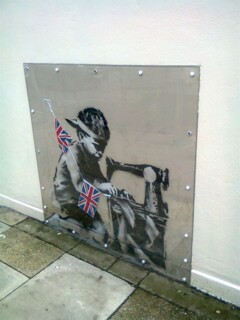At the Theatre
Anna Aslanyan
‘Art is never finished, only altered,’ @therealbanksy tweeted to 130,000 followers last October. Tom Wainwright’s comedy Banksy: The Room in the Elephant opened at the Arcola Theatre in Dalston last week. Wainwright wrote the play in response to the story of Tachowa Covington, who lost his home in a disused water tank in LA after Banksy sprayed ‘This looks a bit like an elephant’ on it two years ago.
The play, directed by Emma Callander, stars Gary Beadle as a homeless man loosely based on Covington. He films himself throughout the production. ‘It ain’t no elephant,’ he says of his tank. He tries to find out from Banksy why he wrote on it.
The performance reminded me of Slave Labour, a Banksy piece that appeared on the wall of a Poundland shop in North London in the summer of 2012, just before the Diamond Jubilee. It’s a picture of a boy sewing Union Jack bunting. When I went to see it, the graffiti was covered with a perspex sheet. A passer-by stopped to photograph it, saw the covering and grumbled something about the local council wasting public money. Later, when the mural disappeared, Haringey Council tried unsuccessfully to get it back.
The night I was there the play was followed by Something From Nothing, a documentary about Tachowa Covington made by Hal Samples. The water tank was an art object before Banksy’s intervention: the work Covington did on its interior resembled a contemporary art exhibition held in an experimental performance space. He managed to recover most of his stuff before the tank was taken away by the people who bought it from the city of LA for the sake of Bansky’s graffiti. Said to have received financial support from Banksy, he now lives in a tent overlooking the land where the tank once stood.
After the show I asked Beadle if Banksy had made any comments about it. ‘He’s not much around,’ the actor said. The show runs at Arcola till 26 April; the next day several Banksy pieces will be sold at a live auction in London. Stealing Banksy? is organised by the Sincura Group, ‘the London based concierge specialists who pride themselves on obtaining the unobtainable’, who take Banksy’s works off walls and restore them. The company says it is acting on behalf of building owners who approach it asking for an unwanted piece to be removed. The profits from the sale will go to local charities. The pieces will be on show at the ME London Hotel on the Strand from 24 April; the most famous of them, No Ball Games, is valued at over £1 million.
Slave Labour resurfaced in 2013 in Miami, where it was going to be auctioned. The Sincura Group brought it back to the UK and arranged its sale. It reportedly went for over £750,000 last June and hasn’t been widely seen since. ‘The very fact that they were trying to preserve it actually destroyed it,’ Grayson Perry said. Destroying – or altering – street art is what councils do, with perspex sheets or paint stripper. Beadle’s character sprays his own work on the theatre backdrop, a real one, as you can both see and smell. It initially depicts Californian mountains, then becomes a diagram of his life, then the final stroke of the can sums things up: a straight horizontal line crosses the drawing, echoed by his parting message, ‘Fuck it.’ Round the corner from Arcola, I stopped to look at the nearby branch of Poundland: its facade remained graffiti-free.


Comments
Why does this sound very like Dorothy Parker's wisecrack about Hepburn, that her acting ran the gamut of emotions from A to B?